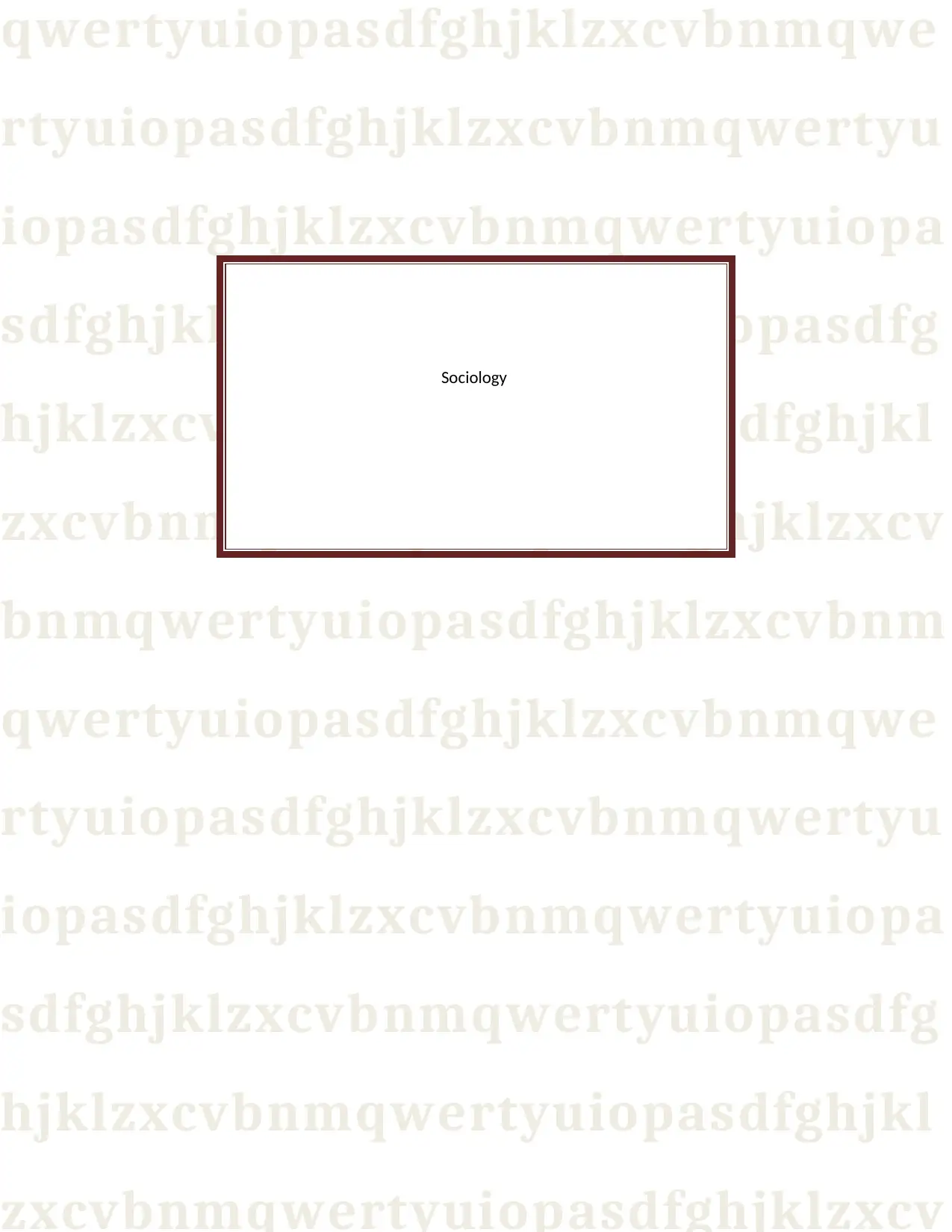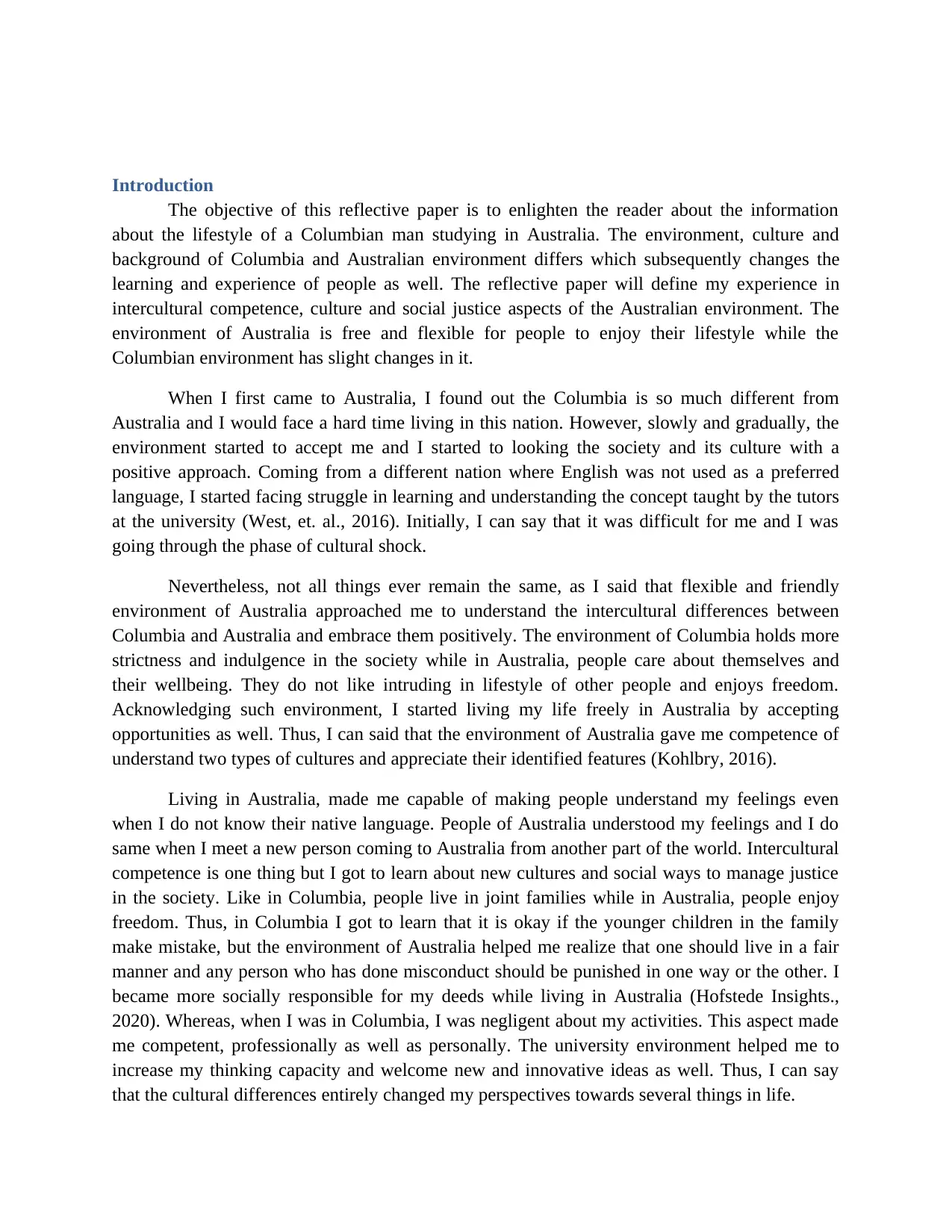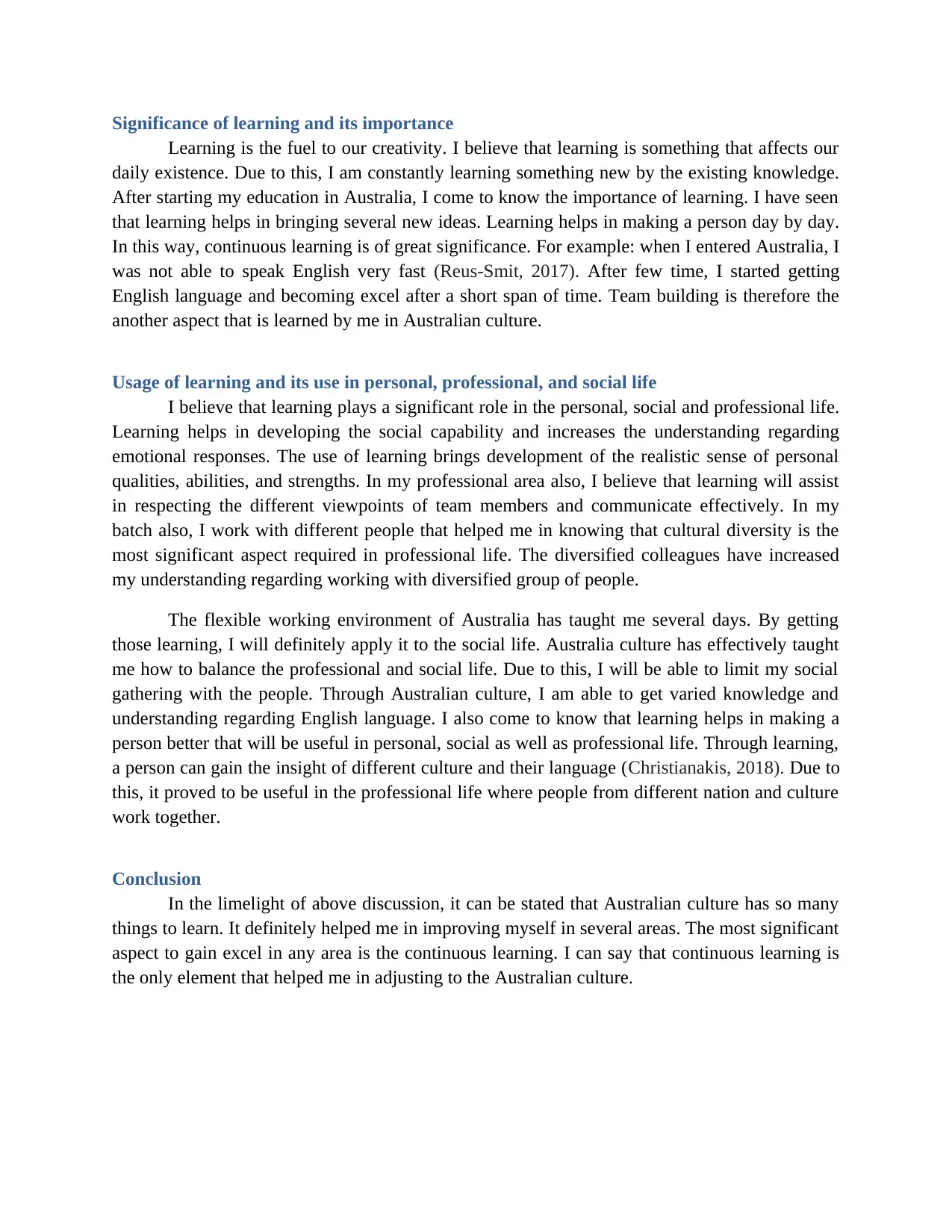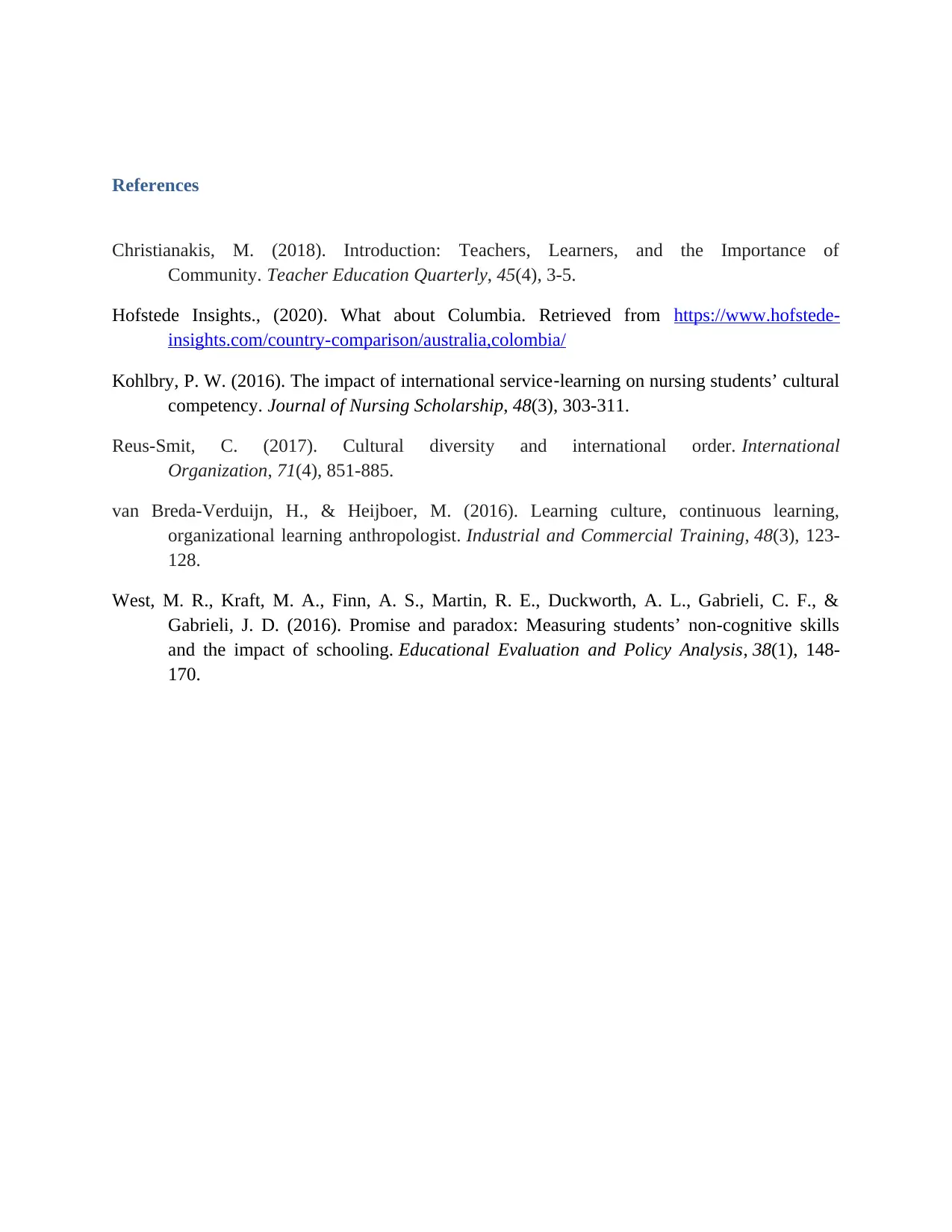Intercultural Competence: A Columbian Student's Australian Journey
VerifiedAdded on 2022/08/25
|4
|1269
|28
Journal and Reflective Writing
AI Summary
This reflective paper examines the experience of a Columbian student studying in Australia, focusing on the significant cultural differences between the two countries and their impact on the student's learning and personal development. The paper details the initial challenges faced, including language barriers and cultural shock, and how the student gradually adapted to the Australian environment, embracing its flexibility and freedom. It explores the development of intercultural competence, the understanding of social justice, and the importance of continuous learning. The student reflects on how the Australian culture fostered a sense of social responsibility and broadened their perspective on life, contrasting it with the more traditional values of their home country. The paper also highlights the role of learning in personal, professional, and social life, emphasizing its significance in adapting to a new culture and developing essential skills for success. The conclusion reiterates the positive impact of the Australian experience on the student's growth and the importance of continuous learning for personal and professional advancement.

qwertyuiopasdfghjklzxcvbnmqwe
rtyuiopasdfghjklzxcvbnmqwertyu
iopasdfghjklzxcvbnmqwertyuiopa
sdfghjklzxcvbnmqwertyuiopasdfg
hjklzxcvbnmqwertyuiopasdfghjkl
zxcvbnmqwertyuiopasdfghjklzxcv
bnmqwertyuiopasdfghjklzxcvbnm
qwertyuiopasdfghjklzxcvbnmqwe
rtyuiopasdfghjklzxcvbnmqwertyu
iopasdfghjklzxcvbnmqwertyuiopa
sdfghjklzxcvbnmqwertyuiopasdfg
hjklzxcvbnmqwertyuiopasdfghjkl
zxcvbnmqwertyuiopasdfghjklzxcv
Sociology
rtyuiopasdfghjklzxcvbnmqwertyu
iopasdfghjklzxcvbnmqwertyuiopa
sdfghjklzxcvbnmqwertyuiopasdfg
hjklzxcvbnmqwertyuiopasdfghjkl
zxcvbnmqwertyuiopasdfghjklzxcv
bnmqwertyuiopasdfghjklzxcvbnm
qwertyuiopasdfghjklzxcvbnmqwe
rtyuiopasdfghjklzxcvbnmqwertyu
iopasdfghjklzxcvbnmqwertyuiopa
sdfghjklzxcvbnmqwertyuiopasdfg
hjklzxcvbnmqwertyuiopasdfghjkl
zxcvbnmqwertyuiopasdfghjklzxcv
Sociology
Paraphrase This Document
Need a fresh take? Get an instant paraphrase of this document with our AI Paraphraser

Introduction
The objective of this reflective paper is to enlighten the reader about the information
about the lifestyle of a Columbian man studying in Australia. The environment, culture and
background of Columbia and Australian environment differs which subsequently changes the
learning and experience of people as well. The reflective paper will define my experience in
intercultural competence, culture and social justice aspects of the Australian environment. The
environment of Australia is free and flexible for people to enjoy their lifestyle while the
Columbian environment has slight changes in it.
When I first came to Australia, I found out the Columbia is so much different from
Australia and I would face a hard time living in this nation. However, slowly and gradually, the
environment started to accept me and I started to looking the society and its culture with a
positive approach. Coming from a different nation where English was not used as a preferred
language, I started facing struggle in learning and understanding the concept taught by the tutors
at the university (West, et. al., 2016). Initially, I can say that it was difficult for me and I was
going through the phase of cultural shock.
Nevertheless, not all things ever remain the same, as I said that flexible and friendly
environment of Australia approached me to understand the intercultural differences between
Columbia and Australia and embrace them positively. The environment of Columbia holds more
strictness and indulgence in the society while in Australia, people care about themselves and
their wellbeing. They do not like intruding in lifestyle of other people and enjoys freedom.
Acknowledging such environment, I started living my life freely in Australia by accepting
opportunities as well. Thus, I can said that the environment of Australia gave me competence of
understand two types of cultures and appreciate their identified features (Kohlbry, 2016).
Living in Australia, made me capable of making people understand my feelings even
when I do not know their native language. People of Australia understood my feelings and I do
same when I meet a new person coming to Australia from another part of the world. Intercultural
competence is one thing but I got to learn about new cultures and social ways to manage justice
in the society. Like in Columbia, people live in joint families while in Australia, people enjoy
freedom. Thus, in Columbia I got to learn that it is okay if the younger children in the family
make mistake, but the environment of Australia helped me realize that one should live in a fair
manner and any person who has done misconduct should be punished in one way or the other. I
became more socially responsible for my deeds while living in Australia (Hofstede Insights.,
2020). Whereas, when I was in Columbia, I was negligent about my activities. This aspect made
me competent, professionally as well as personally. The university environment helped me to
increase my thinking capacity and welcome new and innovative ideas as well. Thus, I can say
that the cultural differences entirely changed my perspectives towards several things in life.
The objective of this reflective paper is to enlighten the reader about the information
about the lifestyle of a Columbian man studying in Australia. The environment, culture and
background of Columbia and Australian environment differs which subsequently changes the
learning and experience of people as well. The reflective paper will define my experience in
intercultural competence, culture and social justice aspects of the Australian environment. The
environment of Australia is free and flexible for people to enjoy their lifestyle while the
Columbian environment has slight changes in it.
When I first came to Australia, I found out the Columbia is so much different from
Australia and I would face a hard time living in this nation. However, slowly and gradually, the
environment started to accept me and I started to looking the society and its culture with a
positive approach. Coming from a different nation where English was not used as a preferred
language, I started facing struggle in learning and understanding the concept taught by the tutors
at the university (West, et. al., 2016). Initially, I can say that it was difficult for me and I was
going through the phase of cultural shock.
Nevertheless, not all things ever remain the same, as I said that flexible and friendly
environment of Australia approached me to understand the intercultural differences between
Columbia and Australia and embrace them positively. The environment of Columbia holds more
strictness and indulgence in the society while in Australia, people care about themselves and
their wellbeing. They do not like intruding in lifestyle of other people and enjoys freedom.
Acknowledging such environment, I started living my life freely in Australia by accepting
opportunities as well. Thus, I can said that the environment of Australia gave me competence of
understand two types of cultures and appreciate their identified features (Kohlbry, 2016).
Living in Australia, made me capable of making people understand my feelings even
when I do not know their native language. People of Australia understood my feelings and I do
same when I meet a new person coming to Australia from another part of the world. Intercultural
competence is one thing but I got to learn about new cultures and social ways to manage justice
in the society. Like in Columbia, people live in joint families while in Australia, people enjoy
freedom. Thus, in Columbia I got to learn that it is okay if the younger children in the family
make mistake, but the environment of Australia helped me realize that one should live in a fair
manner and any person who has done misconduct should be punished in one way or the other. I
became more socially responsible for my deeds while living in Australia (Hofstede Insights.,
2020). Whereas, when I was in Columbia, I was negligent about my activities. This aspect made
me competent, professionally as well as personally. The university environment helped me to
increase my thinking capacity and welcome new and innovative ideas as well. Thus, I can say
that the cultural differences entirely changed my perspectives towards several things in life.

Significance of learning and its importance
Learning is the fuel to our creativity. I believe that learning is something that affects our
daily existence. Due to this, I am constantly learning something new by the existing knowledge.
After starting my education in Australia, I come to know the importance of learning. I have seen
that learning helps in bringing several new ideas. Learning helps in making a person day by day.
In this way, continuous learning is of great significance. For example: when I entered Australia, I
was not able to speak English very fast (Reus-Smit, 2017). After few time, I started getting
English language and becoming excel after a short span of time. Team building is therefore the
another aspect that is learned by me in Australian culture.
Usage of learning and its use in personal, professional, and social life
I believe that learning plays a significant role in the personal, social and professional life.
Learning helps in developing the social capability and increases the understanding regarding
emotional responses. The use of learning brings development of the realistic sense of personal
qualities, abilities, and strengths. In my professional area also, I believe that learning will assist
in respecting the different viewpoints of team members and communicate effectively. In my
batch also, I work with different people that helped me in knowing that cultural diversity is the
most significant aspect required in professional life. The diversified colleagues have increased
my understanding regarding working with diversified group of people.
The flexible working environment of Australia has taught me several days. By getting
those learning, I will definitely apply it to the social life. Australia culture has effectively taught
me how to balance the professional and social life. Due to this, I will be able to limit my social
gathering with the people. Through Australian culture, I am able to get varied knowledge and
understanding regarding English language. I also come to know that learning helps in making a
person better that will be useful in personal, social as well as professional life. Through learning,
a person can gain the insight of different culture and their language (Christianakis, 2018). Due to
this, it proved to be useful in the professional life where people from different nation and culture
work together.
Conclusion
In the limelight of above discussion, it can be stated that Australian culture has so many
things to learn. It definitely helped me in improving myself in several areas. The most significant
aspect to gain excel in any area is the continuous learning. I can say that continuous learning is
the only element that helped me in adjusting to the Australian culture.
Learning is the fuel to our creativity. I believe that learning is something that affects our
daily existence. Due to this, I am constantly learning something new by the existing knowledge.
After starting my education in Australia, I come to know the importance of learning. I have seen
that learning helps in bringing several new ideas. Learning helps in making a person day by day.
In this way, continuous learning is of great significance. For example: when I entered Australia, I
was not able to speak English very fast (Reus-Smit, 2017). After few time, I started getting
English language and becoming excel after a short span of time. Team building is therefore the
another aspect that is learned by me in Australian culture.
Usage of learning and its use in personal, professional, and social life
I believe that learning plays a significant role in the personal, social and professional life.
Learning helps in developing the social capability and increases the understanding regarding
emotional responses. The use of learning brings development of the realistic sense of personal
qualities, abilities, and strengths. In my professional area also, I believe that learning will assist
in respecting the different viewpoints of team members and communicate effectively. In my
batch also, I work with different people that helped me in knowing that cultural diversity is the
most significant aspect required in professional life. The diversified colleagues have increased
my understanding regarding working with diversified group of people.
The flexible working environment of Australia has taught me several days. By getting
those learning, I will definitely apply it to the social life. Australia culture has effectively taught
me how to balance the professional and social life. Due to this, I will be able to limit my social
gathering with the people. Through Australian culture, I am able to get varied knowledge and
understanding regarding English language. I also come to know that learning helps in making a
person better that will be useful in personal, social as well as professional life. Through learning,
a person can gain the insight of different culture and their language (Christianakis, 2018). Due to
this, it proved to be useful in the professional life where people from different nation and culture
work together.
Conclusion
In the limelight of above discussion, it can be stated that Australian culture has so many
things to learn. It definitely helped me in improving myself in several areas. The most significant
aspect to gain excel in any area is the continuous learning. I can say that continuous learning is
the only element that helped me in adjusting to the Australian culture.
⊘ This is a preview!⊘
Do you want full access?
Subscribe today to unlock all pages.

Trusted by 1+ million students worldwide

References
Christianakis, M. (2018). Introduction: Teachers, Learners, and the Importance of
Community. Teacher Education Quarterly, 45(4), 3-5.
Hofstede Insights., (2020). What about Columbia. Retrieved from https://www.hofstede-
insights.com/country-comparison/australia,colombia/
Kohlbry, P. W. (2016). The impact of international service‐learning on nursing students’ cultural
competency. Journal of Nursing Scholarship, 48(3), 303-311.
Reus-Smit, C. (2017). Cultural diversity and international order. International
Organization, 71(4), 851-885.
van Breda-Verduijn, H., & Heijboer, M. (2016). Learning culture, continuous learning,
organizational learning anthropologist. Industrial and Commercial Training, 48(3), 123-
128.
West, M. R., Kraft, M. A., Finn, A. S., Martin, R. E., Duckworth, A. L., Gabrieli, C. F., &
Gabrieli, J. D. (2016). Promise and paradox: Measuring students’ non-cognitive skills
and the impact of schooling. Educational Evaluation and Policy Analysis, 38(1), 148-
170.
Christianakis, M. (2018). Introduction: Teachers, Learners, and the Importance of
Community. Teacher Education Quarterly, 45(4), 3-5.
Hofstede Insights., (2020). What about Columbia. Retrieved from https://www.hofstede-
insights.com/country-comparison/australia,colombia/
Kohlbry, P. W. (2016). The impact of international service‐learning on nursing students’ cultural
competency. Journal of Nursing Scholarship, 48(3), 303-311.
Reus-Smit, C. (2017). Cultural diversity and international order. International
Organization, 71(4), 851-885.
van Breda-Verduijn, H., & Heijboer, M. (2016). Learning culture, continuous learning,
organizational learning anthropologist. Industrial and Commercial Training, 48(3), 123-
128.
West, M. R., Kraft, M. A., Finn, A. S., Martin, R. E., Duckworth, A. L., Gabrieli, C. F., &
Gabrieli, J. D. (2016). Promise and paradox: Measuring students’ non-cognitive skills
and the impact of schooling. Educational Evaluation and Policy Analysis, 38(1), 148-
170.
1 out of 4
Related Documents
Your All-in-One AI-Powered Toolkit for Academic Success.
+13062052269
info@desklib.com
Available 24*7 on WhatsApp / Email
![[object Object]](/_next/static/media/star-bottom.7253800d.svg)
Unlock your academic potential
Copyright © 2020–2026 A2Z Services. All Rights Reserved. Developed and managed by ZUCOL.





